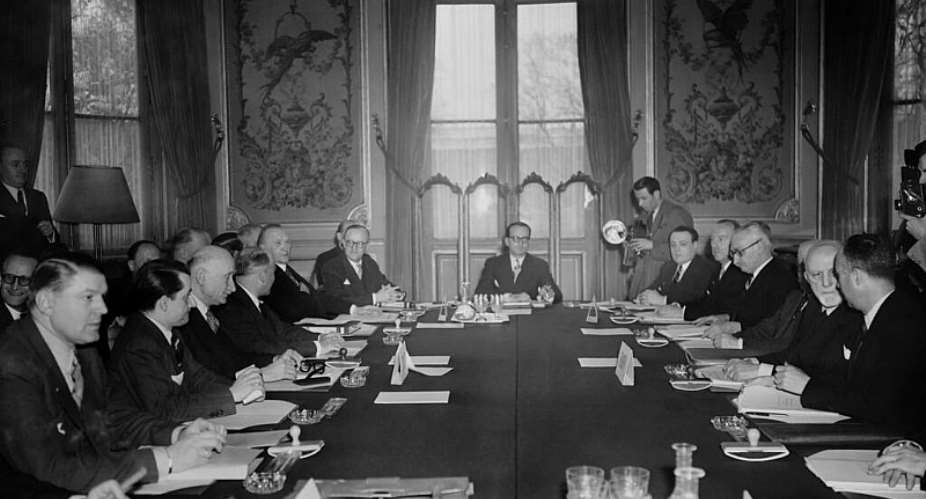On 9 May, Europe commemorates the founding document of the EU – the Schuman Declaration. Signed on the same date in 1950, the declaration was the stepping-stone to cooperation in Europe and peace on the continent.
This year's Europe Day takes place 45 years after the first European elections in 1979 and falls shortly before the elections of 2024 that will be held between 6 and 9 June in all EU.
Europe Day is celebrated on 9 May each year and commemorates the moment when French foreign minister Robert Schuman presented his proposal for the creation of a unified European organisation on 9 May, 1950.
The Schuman Declaration laid the groundwork for what would eventually become the European Union.
"Europe will not be made all at once," said the declaration. "Or according to a single plan. It will be built through concrete achievements which first create a de facto solidarity."
The document says that unity in Europe requires the elimination of the age-old opposition of France and Germany. It adds: "Any action taken must in the first place concern these two countries."
Initially the declaration proposed that Franco-German production of coal and steel as a whole be placed under a common High Authority, which grew into the European Coal and Steel Community, which merged into the European Economic Community that, eventually, became the European Union.
Today, Europe Day serves as a symbol of the EU's openness, transparency, democracy and unity, according to the EU's website.
But almost 75 years after its launch, that togetherness among the now 27 EU member states is coming under increasing threat.
This year's European Parliament elections mark the first without British candidates following the UK's departure from the EU in 2020.
European Commission President Ursula von der Leyen is expected to seek a second term, while new policy priorities and commissioners will reshape the political agenda.
Crucial issues like the Ukraine conflict and the green transition loom large, as do economic challenges.
The EU is grappling with significant debt from pandemic relief efforts, with further financial commitments expected as part of foreign policy.
Pre-Covid fiscal rules are under review, balancing debt containment with flexibility. Top issues for incoming MEPs include energy and climate policy, geopolitics, EU expansion, security, laws on the use of artificial intelligence, competitiveness, economic security, tax regulation, workers' rights and trade disputes.
Populism in Europe has surged with both right-wing and left-wing parties challenging the traditional political order. Fuelled by nationalistic sentiments and scepticism towards the EU, these movements capitalise on public discontent with issues such as immigration and economic inequality.
Countries such as Italy, France and Poland have witnessed substantial gains by populist parties, shaping the discourse around immigration controls.
This rise challenges established European political groups and threatens a more polarised European Parliament.





 2024 polls: Akufo-Addo has packed EC with TESCON, NPP communicators as Commissio...
2024 polls: Akufo-Addo has packed EC with TESCON, NPP communicators as Commissio...
 Speak out on 2024 electoral issues – Mahama to Church leaders
Speak out on 2024 electoral issues – Mahama to Church leaders
 Approval for price increase in dialysis treatment is an error – Parliamentary Co...
Approval for price increase in dialysis treatment is an error – Parliamentary Co...
 Minority calls for forensic audit into World Bank and GARID operations
Minority calls for forensic audit into World Bank and GARID operations
 Eastern Region: Two dead in car crash on Adukrom-Somanya highway
Eastern Region: Two dead in car crash on Adukrom-Somanya highway
 ‘We value your monumental projects in Northern Region’ – Ya Naa to Bawumia
‘We value your monumental projects in Northern Region’ – Ya Naa to Bawumia
 Controversially selecting Rock City Hotel over 14 competitors strange – Ablakwa ...
Controversially selecting Rock City Hotel over 14 competitors strange – Ablakwa ...
 Military brutalities: Wa victims yet to receive compensation - Wa Naa
Military brutalities: Wa victims yet to receive compensation - Wa Naa
 My campaign will base on what I can do for Ghanaians – Bawumia
My campaign will base on what I can do for Ghanaians – Bawumia
 Let me be president too – Dr. Bawumia begs ‘senior brother’ Mahama
Let me be president too – Dr. Bawumia begs ‘senior brother’ Mahama
